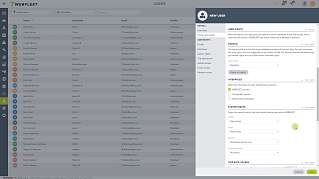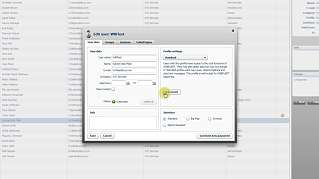





WEBFLEET.connect
The WEBFLEET.connect API connects software applications with the Webfleet fleet management solution. Via WEBFLEET.connect you can enhance the value of all types of business solutions, including routing and scheduling optimisation, ERP, Transport Management System (TMS), supply chain planning, asset management and much more.
Documents & Guides
WEBFLEET.connect API documentation
Get started with WEBFLEET.connect. Learn how to send and receive data for the most used Webfleet API.
WEBFLEET.connect developer guide – Job dispatch
Send jobs to Webfleet and receive job status updates remotely.
WEBFLEET.connect developer guide – Predefined routes over the air
Create predefined routes and include them in your itinerary orders.
WEBFLEET.connect developer guide - Predefined routes over the air (HTML)
WEBFLEET.connect developer guide - Predefined routes over the air (PDF)
WEBFLEET.connect developer guide – Message queues
Using more than one function? Work with message queues. Discover core concepts, tips and tricks.
WEBFLEET.connect developer guide – Driver safety and efficiency
Learn how to use the OptiDrive indicator. Create tools for analysing driver training needs and providing rewards.
WEBFLEET.connect developer guide - Driver safety and efficiency (PDF)
Webfleet Plugins developer guide - Integrate your data into Webfleet UI
Learn how to display your data in the Webfleet user interface.
Webfleet Plugins developer guide (PDF)
LINK.connect
LINK.connect is a Bluetooth interface hosted in the LINK tracking device. LINK.connect enables the connection of applications that enrich data from in-and-around-the-vehicle hardware (barcode scanners, temperature sensors, TPMS, etc.) to the WEBFLEET.connect API.
Documents & Guides
LINK.connect API documentation
Learn how to connect third party devices to the LINK unit via the LINK.connect interface.
PRO X
The PRO X developer resources allow you to efficiently customise and control PRO X. As a developer, you can utilize platform APIs to enhance your applications, and tailor the devices to your customers' business needs. Even as a non-developer, you can easily manage PRO X, i.e. by rolling out master settings, hide/block apps, customise the home screen, control the shortcut bar and more.
PRO.connect
The PRO.connect SDK allows you to access Webfleet functionality on the TomTom PRO 82xx series of ruggedised Driver Terminals. As a developer, you can customise the Webfleet order workflow according to your customers’ business needs, including: barcode scanning, digital signature, question paths and photos. Data from the field can be sent to the back office via the LINK device, so your customers need fewer connectivity sources and can save on network costs.
The TomTom PRO 82xx series comes with a mobile device management (MDM) system. Our Mobile Device Manager empowers customers to administer their TomTom PRO 82xx series more efficiently. Customers can update and configure devices remotely – and control the content installed on each unit.
SDK
Documents & Guides
PRO.connect developer guide
Get started using PRO.connect. Import the PRO.connect SDK into your development environment (Eclipse) and set up a PRO.connect project.
PRO.connect SDK documentation
Learn how to use the PRO.connect SDK, including Webfleet orders, text messages, custom data and much more.
Code examples
PRO.connect code examples
Learn the basic concepts of the PRO.connect SDK and start developing. Descriptions of the examples are included in the PRO.connect developer guide.
PRO.connect reference implementation
This is a sample code for the standard Webfleet order flow and messaging functionality. It allows you to develop a customised work order flow for your customers’ team – with minimal effort.
PRO 8 Driver Terminals
The PRO 8 Platform is a solution to help your business move more efficiently. It is a platform to enable you to seamlessly connect your business applications with solutions from Webfleet.
Documents & Guides
PRO 8 Driver Terminal Developer documentation
Get started with development for the PRO 8. Learn about integration possibilities the platform offers.
TachoShare.connect
TachoShare.connect is an API that allows partners to access the tachograph data belonging to Webfleet customers, which is stored in the Webfleet Telematics Service Platform (WTSP). This document provides all the information you need to integrate customer’s tachograph data into your system or application using TachoShare.connect interface.
Documents & Guides
TachoShare.connect API documentation
Get started with TachoShare.connect. Learn how to get tachograph and driver card files.
Accessing OAuth Webfleet APIs
Learn how to access to TachoShare.connect API.
Code examples
OAuth client Java example
This sample code shows a Java Spring Web application accessing Webfleet APIs using OAuth 2.0 authorization code flow.
Postman collection
The purpose of this collection is to show the different flows involved, starting with the authentication and ending with the obtention of tachograph data.
This Postman collection includes three JSON files:
production.postman_environment.json defines the URLs of Webfleet Authentication server and TachoShare.connect.
production.postman_environment.json includes all the API calls needed to complete OAuth authentication process.
TachoShare.connect.postman_collection.json includes all the API calls needed to gather tachograph and driver cards data.
Request API access (API key)
To receive access to the Webfleet APIs, please follow the steps below:
Request an API key
For customers
If you are a Webfleet customer and would like to request an API key (e.g. to connect a 3rd party system with Webfleet) please complete our online request form. To access the online request form you need to login to your My Account via the Customer Community on the Webfleet website or create a new account if required. Then choose API key request in the Category drop-down menu.
For external integration partners
If you are a systems integrator and would like to request an API key, please join the .connect Partner Program. Once you are registered in the program, you will receive your first API key. To request further API keys, follow the process described above for customers.
Set up a dedicated WEBFLEET.connect account
To complete this step, follow the process described in the WEBFLEET.connect API documentation.
Alternatively follow the instructions in the video.
Webfleet
Webfleet Classic
Not a .connect Partner yet?
Your consent is required
In this section, external content is being embedded from .
To display the content, your consent is required for the following cookie categories:
- Targeted Advertising
- Analytics & Personalization
- Essential
For further details, please refer to our privacy policy. If you are interested in how ###vendor_name### processes your data, please visit their privacy policy.














